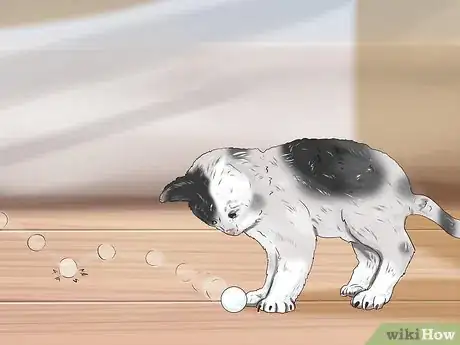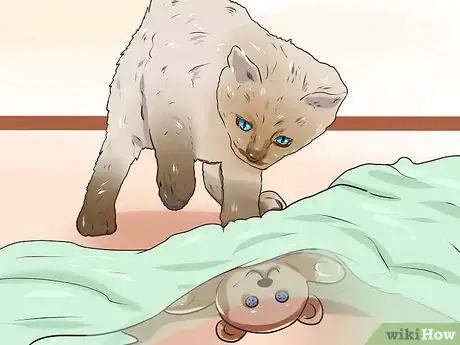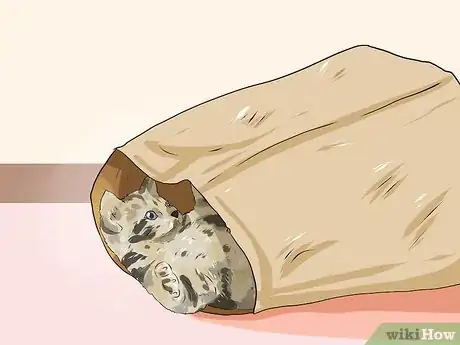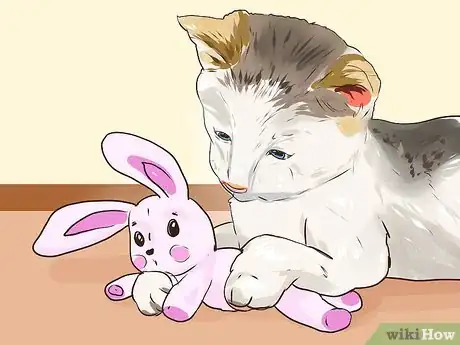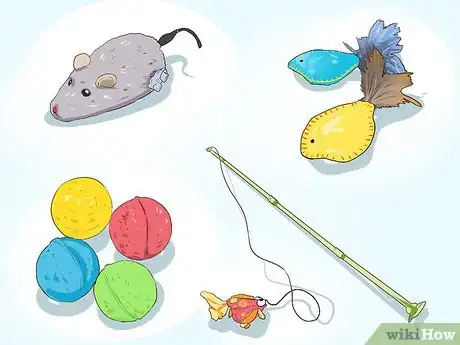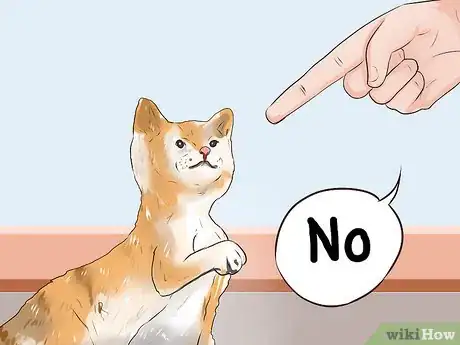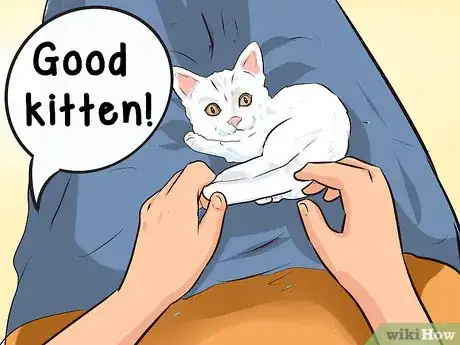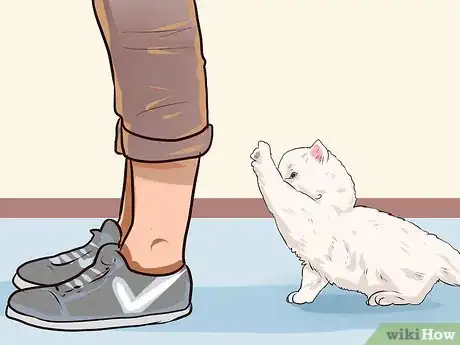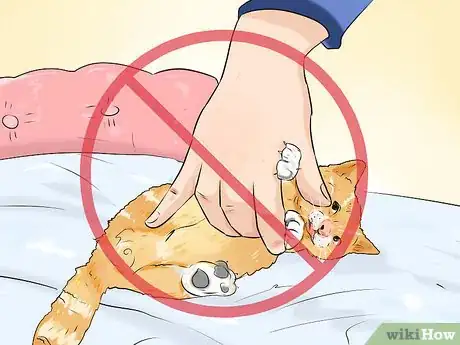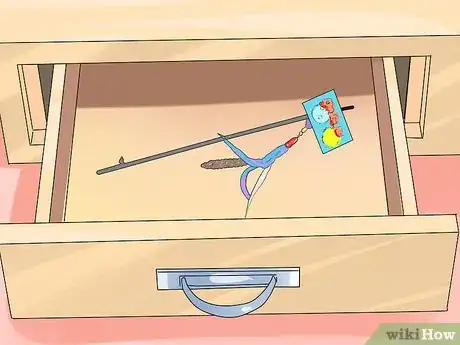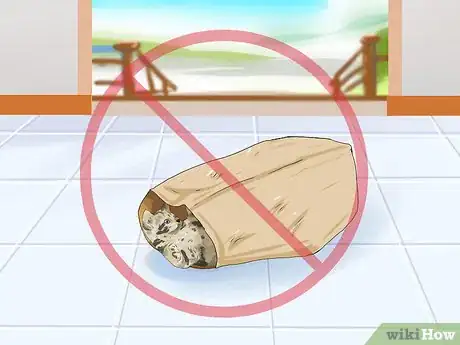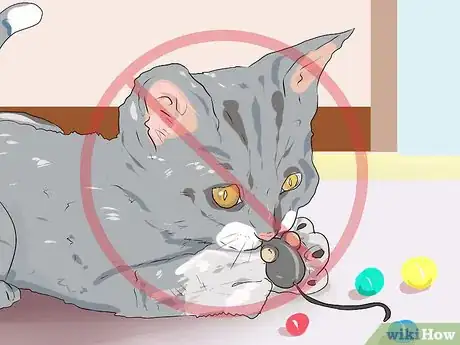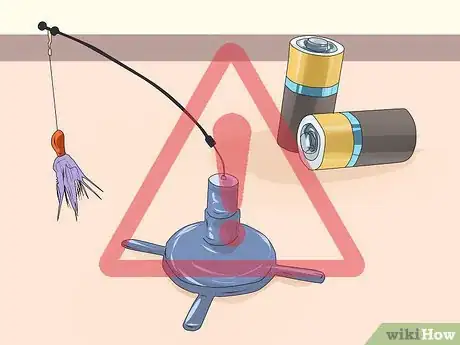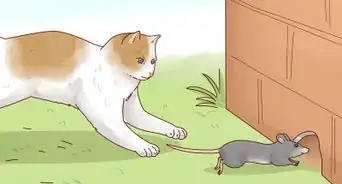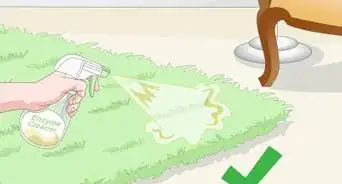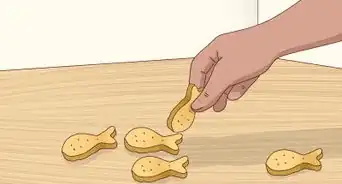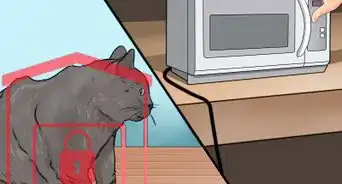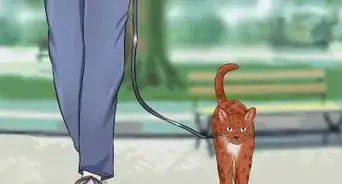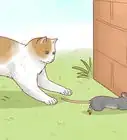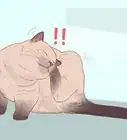This article was co-authored by Melissa Nelson, DVM, PhD. Dr. Nelson is a Veterinarian who specializes in Companion and Large Animal Medicine in Minnesota, where she has over 18 years of experience as a veterinarian in a rural clinic. She received her Doctor of Veterinary Medicine from the University of Minnesota in 1998.
wikiHow marks an article as reader-approved once it receives enough positive feedback. In this case, 85% of readers who voted found the article helpful, earning it our reader-approved status.
This article has been viewed 108,412 times.
Playing with a kitten is important. Kittens need to play for exercise and to prevent boredom. Playing with your kitten can also help your kitten bond with you. Play a variety of games with your kitten, using a variety of fun toys. Encourage your kitten to be gentle when playing, discouraging behaviors like biting. Make sure the toys you pick are safe. You don't want your kitten to play with anything potentially harmful.
Steps
Playing Games with Your Kitten
-
1Use a ping pong ball. You don't need to stock up on fancy cat toys to have fun. You may have something your cat would love just lying around the house. If you have any ping pong balls, or similar types of balls, your kitten will love playing with these.[1]
- Bounce a ping pong ball against the wall and allow your kitten to chase it. Ping pong balls bounce easily, so they'll move around fast. This is sure to attract a kitten's attention.
-
2Hide a stuffed toy under a blanket. Place a small plush toy under a blanket. Wiggle it around so your kitten thinks it's a mouse or other animal. Your kitten will pounce on the toy and get plenty of fun playing a game like this.[2]
- For an even more economical cat toy, you can also make balls out of crumpled paper. This DIY cat toy creates a rustling noise that cats are evolved to pay attention to due to its likeness to the rustling sounds made by small animals e.g. in a bush. Also, the imperfection in the roundness randomizes how it will roll on the floor. Unlike a ping pong ball, a paper ball would not travel too far, so this limits the playing into a smaller area and makes playtime easier to manage.
- When hiding toys under blankets, don't use a blanket your kitten’s claws can damage, unless you don't mind a few plucks or rips.
- You may not want to play this game if you let your kitten sleep in your bed. This may encourage your kitten to pounce on your feet while you're trying to sleep.
Advertisement -
3Let your kitten play in a paper bag. If you get home from the grocery store, place a paper bag on the ground. Many kittens love playing in paper bags. You can take a small toy and poke the sides of the paper bag with it. This will give your cat something to play with inside the paper bag.[3]
- You can also set down a paper bag while playing with a ribbon or string with your cat. The kitten will use the paper bag as a hiding spot from which to jump out at their prey.
-
4Provide your kitten with plush toys. Kittens love play hunting. In the wild, play is a form of practice for hunting later in life. Your kitten will love having small plush toys to stalk. Choose toys big enough for your kitten to carry in its mouth.[4]
- You can throw these toys around for your kitten like a ping pong ball. However, plush toys are also great as your kitten will play with them on its own. This can help keep your kitten entertained while you're out of the house.
- Plush toys that can be filled with treats are also a great way to keep your kitten occupied.
-
5Use trial and error to figure out what your kitten likes. Every kitten has different preferences when it comes to toys. If your kitten doesn't like a certain toy, don't try to force it. Buy a variety of types of toys for your kitten and see what it takes to.[5]
Teaching Your Kitten to Play Nice
-
1Correct bad behaviors gently. Kittens often do not understand boundaries. When young, they may view you as a kitten. They may bite your hand or another body part during play. You should never scold or punish a kitten for this behavior. It's likely to make a kitten nervous. Instead, gently correct the behavior.[6]
- When a kitten bites you, gently say, "No." Then, pull your hand away.
- Provide your kitten with a toy to chew on instead.
-
2Praise positive behavior. In addition to correcting bad behavior, praise your kitten for behaving. If your kitten has been pouncing on your feet when you walk by, and refrains from doing it one day, say something like, "Good kitten!" If your kitten sits in your lap without biting or clawing, pet and praise your kitten.[7]
-
3Ignore your kitten when it misbehaves. If a kitten continues to misbehave after being corrected, ignore the behavior Kittens often act out because they want attention. For a kitten, any response, even a negative one, may be a positive one. Therefore, simply ignoring biting until a kitten stops is often effective.[8]
-
4Do not let your kitten play with your hands or fingers. Many people play wrestle with their kitten, or allow their kitten to paw at their finger. This sends a message that biting and scratching are appropriate behaviors. This can become more of a problem as your kitten grows.[9]
- Avoid sticking your hand in the kitten's face when you're playing. Your kitten may see this as an invitation to bite or scratch your hand.
Keeping Your Kitten Safe
-
1Put fishing pole toys away when you're not using them. Fishing pole toys are sold at many department and pet stores. While they can provide hours of fun for a kitten, they should not be used if your kitten is unsupervised. These tend to have a lot of small parts. Put them away when you're not there to supervise your kitten.[10]
-
2Do not leave bags in areas where they could get stepped on. It can be fun to let your kitten play in a paper bag. However, don't leave a paper bag out where it could be stepped on. Someone could easily step on your kitten inside the paper bag. Much like other toys, it's generally best to put paper bags away altogether when you're not there to supervise.[11]
-
3Make sure toys aren't small enough to be swallowed. Kittens may swallow their toys by mistake when playing. Therefore, you should not get your kitten any toys that are small enough to be easily swallowed. Stick to toys bigger than your kitten's mouth for safety.[12]
-
4Avoid leaving toys with batteries out. Battery operated toys can be fun for your cat. However, you may be inclined to leave them out when you're gone so your kitten can play with them in your absence. Battery-operated toys should be put away when you're not present. Cats could potentially get into the batteries, which can be harmful if chewed on or swallowed.[13]
Expert Q&A
-
QuestionWhat kind of toys do kittens like to play with?
 Melissa Nelson, DVM, PhDDr. Nelson is a Veterinarian who specializes in Companion and Large Animal Medicine in Minnesota, where she has over 18 years of experience as a veterinarian in a rural clinic. She received her Doctor of Veterinary Medicine from the University of Minnesota in 1998.
Melissa Nelson, DVM, PhDDr. Nelson is a Veterinarian who specializes in Companion and Large Animal Medicine in Minnesota, where she has over 18 years of experience as a veterinarian in a rural clinic. She received her Doctor of Veterinary Medicine from the University of Minnesota in 1998.
Veterinarian They like a lot of toys: sparkly balls, feathery type toys, fake mice. What not to play with them is very important: strings, threads, yarn or rubber bands. They can swallow them potentially causing serious injury and even death.
They like a lot of toys: sparkly balls, feathery type toys, fake mice. What not to play with them is very important: strings, threads, yarn or rubber bands. They can swallow them potentially causing serious injury and even death. -
QuestionHow long do you play with your kittens?
 Melissa Nelson, DVM, PhDDr. Nelson is a Veterinarian who specializes in Companion and Large Animal Medicine in Minnesota, where she has over 18 years of experience as a veterinarian in a rural clinic. She received her Doctor of Veterinary Medicine from the University of Minnesota in 1998.
Melissa Nelson, DVM, PhDDr. Nelson is a Veterinarian who specializes in Companion and Large Animal Medicine in Minnesota, where she has over 18 years of experience as a veterinarian in a rural clinic. She received her Doctor of Veterinary Medicine from the University of Minnesota in 1998.
Veterinarian Its a good idea to play with kittens (over the age of 3-4 weeks) at least twice a day.
Its a good idea to play with kittens (over the age of 3-4 weeks) at least twice a day. -
QuestionHow rough should kittens play with each other?
 Melissa Nelson, DVM, PhDDr. Nelson is a Veterinarian who specializes in Companion and Large Animal Medicine in Minnesota, where she has over 18 years of experience as a veterinarian in a rural clinic. She received her Doctor of Veterinary Medicine from the University of Minnesota in 1998.
Melissa Nelson, DVM, PhDDr. Nelson is a Veterinarian who specializes in Companion and Large Animal Medicine in Minnesota, where she has over 18 years of experience as a veterinarian in a rural clinic. She received her Doctor of Veterinary Medicine from the University of Minnesota in 1998.
Veterinarian As long as they are about the same size and age they will play a little roughly occasionally. They will generally "correct" each others behavior. However, if one kitten is in obvious distress you'll have to break up the play.
As long as they are about the same size and age they will play a little roughly occasionally. They will generally "correct" each others behavior. However, if one kitten is in obvious distress you'll have to break up the play.
References
- ↑ https://pethelpful.com/cats/easygamesforcats
- ↑ https://pethelpful.com/cats/easygamesforcats
- ↑ https://pethelpful.com/cats/easygamesforcats
- ↑ http://www.vetstreet.com/our-pet-experts/toys-that-are-safe-for-your-kitten?page=2
- ↑ http://icatcare.org/advice/playing-your-cat
- ↑ http://www.humanesociety.org/animals/cats/tips/kitten_play.html
- ↑ http://www.humanesociety.org/animals/cats/tips/kitten_play.html
- ↑ http://www.humanesociety.org/animals/cats/tips/kitten_play.html
- ↑ http://www.humanesociety.org/animals/cats/tips/kitten_play.html
- ↑ http://www.vetstreet.com/our-pet-experts/toys-that-are-safe-for-your-kitten?page=2
- ↑ http://www.vetstreet.com/our-pet-experts/toys-that-are-safe-for-your-kitten?page=2
- ↑ http://www.vetstreet.com/our-pet-experts/toys-that-are-safe-for-your-kitten?page=2
- ↑ http://www.vetstreet.com/our-pet-experts/toys-that-are-safe-for-your-kitten?page=2
About This Article
Kittens love to play, so there’s almost always something on hand you can use to play with them. For instance, you can roll a ping-pong ball across the floor for your kitten to chase, or you can tie a string to a stick and dangle it over your kitten’s head so it can jump. You could also give your kitten a paper bag to play in, or you could hide a toy beneath a blanket. However, try not to encourage the kitten to attack your hands or feet, since this will make the kitten think it’s okay to bite or scratch you. Read on for tips from our veterinary reviewer on keeping your kitten safe!
